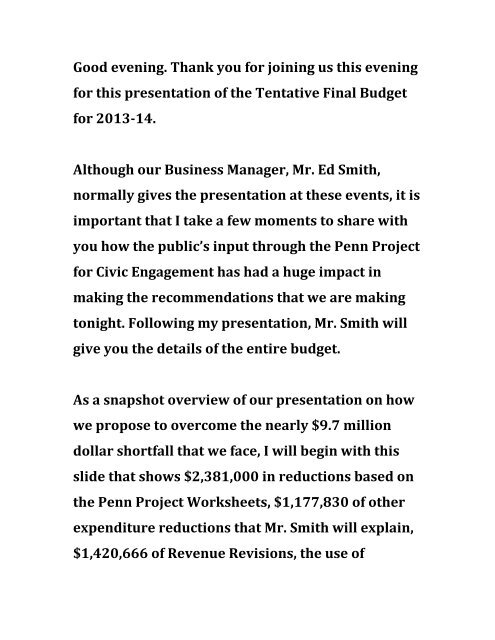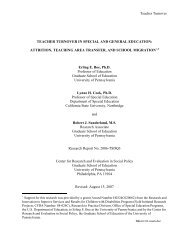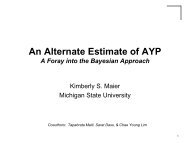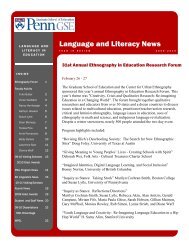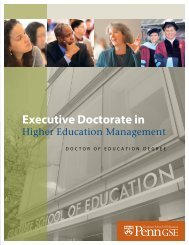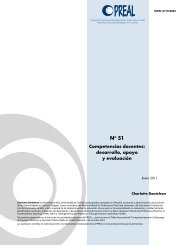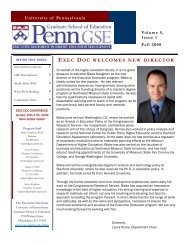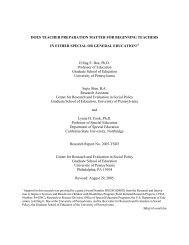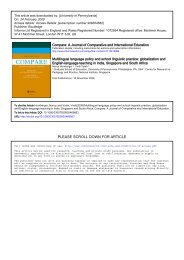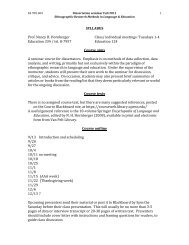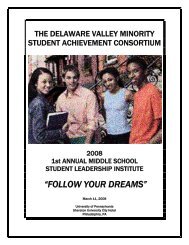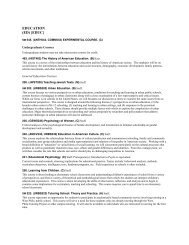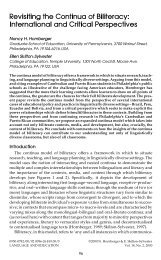Budget Narrative - Penn GSE
Budget Narrative - Penn GSE
Budget Narrative - Penn GSE
Create successful ePaper yourself
Turn your PDF publications into a flip-book with our unique Google optimized e-Paper software.
Good evening. Thank you for joining us this evening <br />
for this presentation of the Tentative Final <strong>Budget</strong> <br />
for 2013-‐14. <br />
Although our Business Manager, Mr. Ed Smith, <br />
normally gives the presentation at these events, it is <br />
important that I take a few moments to share with <br />
you how the public’s input through the <strong>Penn</strong> Project <br />
for Civic Engagement has had a huge impact in <br />
making the recommendations that we are making <br />
tonight. Following my presentation, Mr. Smith will <br />
give you the details of the entire budget. <br />
As a snapshot overview of our presentation on how <br />
we propose to overcome the nearly $9.7 million <br />
dollar shortfall that we face, I will begin with this <br />
slide that shows $2,381,000 in reductions based on <br />
the <strong>Penn</strong> Project Worksheets, $1,177,830 of other <br />
expenditure reductions that Mr. Smith will explain, <br />
$1,420,666 of Revenue Revisions, the use of
$2,600,000 from the Fund Balance, and a proposed <br />
tax hike of 2.94% that will generate $2,097, 973. <br />
Combined, this will give us the $9,677,469 that we <br />
need to balance the budget for the upcoming school <br />
year. <br />
Before I begin to show you the recommended <br />
reductions based on the <strong>Penn</strong> Project Worksheets, I <br />
feel it is important to share with you the guiding <br />
values that came out of the forums that we used in <br />
making our decisions. <br />
First, it is evident that there is tension in our <br />
community between property values, the quality of <br />
our schools, and what people can afford. This is <br />
nothing new here. Yet we all know that there is a <br />
direct correlation between property values and <br />
good schools. Poor schools drive down property <br />
values.
Second, Dr. Harris Sokoloff stated in his recent <br />
presentation that there was a mistrust of the <strong>Penn</strong> <br />
process from the community participants. Although <br />
we recognize that costs on the sheets were rounded <br />
up or down and that there could have been more <br />
items with more specific action and impact <br />
statements, the values that you presented were key <br />
in this process. I hope you will leave this evening <br />
feeling that we applied those values to the <br />
reductions that are being proposed and that this <br />
process gave you a voice unlike ever before in the <br />
budget decision-‐making. <br />
Values three, four, and five on this slide echo similar <br />
sentiments. We get it loud and clear that in making <br />
all of these recommendations that the students <br />
should come first and that we should especially not <br />
make cuts to those programs that we hold so dear in <br />
this community: kindergarten, the arts, music, and <br />
sports. I am pleased to say that all of these areas will
emain intact for our students for the upcoming <br />
year! <br />
Moving to our next slide, Value 6 asked that we <br />
“insure equity” in our decision-‐making. Indeed, as <br />
you see some of our recommendations, equity is a <br />
key goal. <br />
Value 7 recommends that we redesign for efficiency, <br />
effectiveness, and savings. As you will see, this value <br />
is evident throughout many of our <br />
recommendations. <br />
Value 8 asks that we work with others to reduce <br />
costs and improve savings. This will be an ongoing <br />
effort. However, I am proud tonight to announce <br />
that Martha Menz and I met yesterday with Barbara <br />
Bassett from the Philadelphia Art Museum, and she <br />
informed us that thanks to a grant that we jointly <br />
applied for from the Ethel Sargent Clark Smith
Memorial Foundation, all of our 5 th grade students <br />
will have their bussing and admission to the <br />
Philadelphia Art Museum provided for free for the <br />
upcoming year. This is a savings for the taxpayers of <br />
this community and helps to maintain our fine <br />
tradition of exposure to the arts for our students. <br />
In addition, I want to thank our regular school <br />
board meeting participant, Dr. Carlton Orchinick, <br />
for connecting us to another local resident, Dr. <br />
Suzanne Rocheleau from Drexel University <br />
regarding the Visiting Scholars Program at Drexel. <br />
Last week, the Upper Darby High School Guidance <br />
Department and I met with Dr. Rocheleau to form a <br />
partnership that will enable our top flight students <br />
to be able to accumulate college credits in <br />
sophomore, junior, and senior years of high school <br />
by taking college courses with college students at <br />
Drexel each term of Drexel’s school year, or four <br />
terms per year. The incredible fact about this
partnership is that outside of a $75 registration fee, <br />
these courses in the Visiting Scholars Program that <br />
stretch across all aspects of Drexel’s major areas of <br />
study will be free to our students. It is our hope that <br />
we can continue to foster relationships with other <br />
partners that will both bring savings for our <br />
taxpayers as well as opportunities for our students. <br />
Value 9 asks that we “minimize the impact on those <br />
adults with the fewest resources.” We took that to <br />
mean both our taxpayers as well as employees <br />
whose salaries are the lowest in our workforce. You <br />
recommended using attrition wherever possible as <br />
opposed to laying people off. This value is reflected <br />
in areas throughout our proposal as well. <br />
Finally, Value 10 recommends that we “focus on the <br />
long term, not just this year.” Although the <br />
presentation this evening will not address long <br />
term planning, preliminary discussions are already
taking place as to probable areas for investigation <br />
for next year and beyond. <br />
With these ten values in mind, let me begin by going <br />
through the recommendations that you, the public, <br />
made through the forums. Please keep in mind that <br />
no group reached the goal of 100 points, so some <br />
very difficult decisions had to be made in addition <br />
to yours to balance the budget. <br />
We will begin our reductions by looking at those <br />
areas voted as “Low Hanging Fruit” and “Shared <br />
Pain.” Once again, as Dr. Sokoloff made very clear, <br />
the sentiment among the groups was that there is <br />
no such thing as “Low Hanging Fruit.” Everything <br />
was painful. We agree. <br />
The area receiving the highest number of group <br />
votes for “Low Hanging Fruit” was #22, The Office of <br />
the Superintendent. As you can see at the top of the
slide, eleven groups, with each group consisting of <br />
20 to 30 participants, considered this to be an easy <br />
one as “Low Hanging Fruit.” Beneath that is the <br />
description from the <strong>Penn</strong> Project for Civic <br />
Engagement Worksheet, and beneath that is the <br />
Administration’s Recommendation. We support this <br />
recommendation to reduce secretarial help on the <br />
Superintendent’s floor of the Administration <br />
Building through attrition and a redistribution of <br />
duties there. This will save only $54,000, but every <br />
bit helps. <br />
The next highest vote getter was #28, <br />
Transportation, where 10 groups found this to be <br />
“Low Hanging Fruit.” In an effort to support the <br />
value to “redesign for efficiency, effectiveness, and <br />
savings,” we recommend one instead of two late <br />
busses at the middle and high school levels and the <br />
redesign of district bus runs so that a minimum of <br />
three bus runs are eliminated. The new software for
Transportation is expected to improve efficiency as <br />
well. Although there will be a reduction in budgeted <br />
field trips, we hope that the partnership with the <br />
Art Museum that I mentioned earlier as well as our <br />
Upper Darby Arts and Education Foundation grants <br />
will help to keep these field trip opportunities <br />
strong. Mr. Smith projects a savings of $294,000 in <br />
this budget line. <br />
Third on the list of “Low Hanging Fruit” from the <br />
forums was #1, Elementary Classroom Teachers.” <br />
The proposal from the <strong>Penn</strong> Project for Civic <br />
Engagement was to reduce 10 elementary teachers. <br />
Our recommendation is to reduce the elementary <br />
teaching force by only 7 teachers so as to impact <br />
class size as little as possible. However, to “insure <br />
equity” and “efficiency” in class size across the <br />
district, some forced transfers may have to take <br />
place. This will bring a savings of $840,000.
Seven groups voted to eliminate the positions of the <br />
Coordinator and Secretary of Instructional Media, <br />
#17. Both of these positions do not deal with <br />
students directly, and are therefore less valuable <br />
according to the values expressed by you. We <br />
support your recommendation and plan to redesign <br />
these roles for “efficiency, effectiveness, and <br />
savings.” Many of these responsibilities will be <br />
picked up by our Coordinator of Public Information <br />
and others for a savings of $211,000. <br />
Receiving the same number of group votes was #23, <br />
The Office of the Principal. The <strong>Penn</strong> Worksheet <br />
recommended cutting that staff by 5%. Although on <br />
the surface, this would appear to be an easy <br />
decision, those who know the increased demands <br />
on our school secretaries due to mandated state <br />
reporting as well as the volume of paperwork and <br />
calls due to our large school sizes would not <br />
recommend this action. In addition, two high school
secretaries have been reduced within the past two <br />
years without fanfare due to attrition in order to <br />
create “efficiency and a savings.” Therefore, the <br />
administration does not support a reduction here. <br />
The next recommendation from the public with 2 <br />
groups voting for 5% and 7 groups voting for 10% <br />
was #19, reduction in the administrative staff <br />
overseeing Instruction and Curriculum. For those <br />
members of our community who are participating <br />
in writing our new Comprehensive Plan, you have <br />
seen in detail how the new State mandated <br />
appraisal system for both teachers and principals <br />
will make it nearly impossible for our district <br />
administrators to meet their responsibilities. <br />
Currently, Upper Darby has the largest ratio of <br />
administrators to teachers and administrators to <br />
students in the county. A January 2013 study by the <br />
<strong>Penn</strong>sylvania School Boards Association showed <br />
that the average administrator to student ratio
across the state for school districts of 4, 351 <br />
students or more is one administrator to 196.7 <br />
students. In Upper Darby, the ratio is one <br />
administrator to 276 students, 80 students higher <br />
than the State average. The past two budgets have <br />
cut four administrators and forced redesign of roles <br />
for “efficiency, effectiveness, and savings.” However, <br />
further cuts will impact the quality of instruction in <br />
the classroom through diminished supervision, <br />
mentorship, and monitoring of teachers, thus <br />
impacting negatively upon student learning, a value <br />
that we were asked to keep in mind. Therefore, we <br />
cannot support this recommendation. <br />
Next, 5 groups voted as “Low Hanging Fruit” to <br />
reduce the secretarial support by 5% in the offices <br />
of the Business/Fiscal Services or the first floor of <br />
the Administration Building. Once again, attrition <br />
will be used to eliminate two positions and to create
more “efficiency and effectiveness” for a “savings” of <br />
$88,000. <br />
As you can see as we move along through this <br />
process, fewer groups are able to identify “Low <br />
Hanging Fruit.” The decisions are becoming more <br />
difficult. Now we are at the point that only 4 groups <br />
found our next highest vote getter, #7, reducing <br />
High School Teachers by 10 positions to be a <br />
relatively easy choice. As an Administration, we <br />
believe reducing 10 positions would have too much <br />
of an impact upon instruction. Therefore, we are <br />
recommending a more modest reduction of 4 <br />
positions through attrition. With the use of our new <br />
scheduling software, it is anticipated that more <br />
balanced class sizes will be created across the day <br />
to “insure equity” that will have minimal impact <br />
upon student learning. This will bring a savings of <br />
$480,000.
Our next slide, shows the shift from pure “Low <br />
Hanging Fruit” to more of a “Shared Pain.” Only 2 <br />
groups voted to eliminate Elementary Lead <br />
Teachers as “Low Hanging Fruit” while 5 groups <br />
could accept this cut as “Shared Pain.” Knowing the <br />
size of our large elementary schools where the Lead <br />
Teachers are located, the administration believes <br />
that there would be a negative impact on everything <br />
from student safety to management of the <br />
educational program if those Lead Teachers were <br />
eliminated. In other districts, schools the size of our <br />
large schools have assistant principals at a much <br />
higher financial cost. The Administration believes <br />
that the current Lead Teacher model is both <br />
“efficient and effective” in our elementary schools <br />
and should not be cut. <br />
(Next slide)
The Administration feels similarly about the <br />
recommendation to cut Middle School Lead <br />
Teachers where a reduction had taken place <br />
previously. Our School Capacity Task Force has <br />
identified our middle schools as the schools of most <br />
concern about size. Reduction of Lead Teacher <br />
leadership in those buildings could have an adverse <br />
effect upon the management and efficiencies of <br />
those buildings. <br />
(Next slide) <br />
However, an analysis of the Lead Teachers at Upper <br />
Darby High School has yielded some support for a <br />
reduction. Although the <strong>Penn</strong> Project for Civic <br />
Engagement suggested cutting 2 Lead Teachers at <br />
the high school, and the public had 2 groups vote for <br />
it as “Low Hanging Fruit” and 3 groups as “Shared <br />
Pain,” the administration supports a “redesign for <br />
“efficiency, effectiveness, and savings” by
eliminating 1 Lead Teacher through attrition. The <br />
remaining 3 Lead Teachers would work as a team <br />
across all four grades to handle lower-‐level <br />
discipline offenses. Knowing that discipline is <br />
significantly reduced in Junior and Senior years, the <br />
“redesign” of Lead Teachers working as a team <br />
rather than in isolation should actually bring relief <br />
to those who are Lead Teachers in Freshman and <br />
Sophomore years. This would bring a savings of <br />
$120,000. <br />
The next area that the public recommended that we <br />
consider is the elimination of Computer Lab <br />
Assistants at the Elementary Schools. Three groups <br />
found eliminating the Computer Lab Assistants as <br />
“Low Hanging Fruit.” Upon discussion of this <br />
recommendation, the Administration looked at <br />
inefficiencies that needed to be addressed in our <br />
elementary schools. One area that stood out due to <br />
the reduction of elementary librarians last year is
the integrity of our elementary school libraries in <br />
the checking out of books, collection of books, and <br />
restocking the books in the proper areas. Our <br />
district has invested a great deal of money into <br />
these book collections, and they deserve to be kept <br />
intact. Therefore, it is the recommendation of the <br />
Administration to shift the role of the Computer Lab <br />
Assistants to the libraries of their schools to <br />
maintain the integrity and order of the book <br />
collections. <br />
The last two slides in the area of “Low Hanging Fruit” <br />
are areas that we have already mentioned. <br />
The first is the Fund Balance. 5 groups voted as <br />
“Low Hanging Fruit” to use $2 million dollars of our <br />
Fund Balance this year. Although we agree that the <br />
less we use of the Fund Balance now, the better <br />
footing we have for the future, we also have to keep <br />
in mind the value expressed in the <strong>Penn</strong> forums that
we “minimize the impact on those adults with the <br />
fewest resources.” It is a delicate balance trying to <br />
maintain quality schools with low taxes. Therefore, <br />
we are recommending the use of $2.6 million <br />
dollars from the Fund Balance for this budget. Mr. <br />
Smith will speak more to this later in his <br />
presentation. <br />
This leads us to the Property Tax increase. We had 9 <br />
groups between “Low Hanging Fruit” and “Shared <br />
Pain” recommend a tax increase at the index of <br />
2.4%. We had 5 groups between “Low Hanging Fruit” <br />
and “Shared Pain” recommend our tax increase to <br />
go up as high as 4%. Although by law, we could raise <br />
taxes as high as 6.6% without going to referendum, <br />
we are recommending a 2.94% tax increase that <br />
falls in between the two levels recommended by the <br />
public. <br />
(Next slide)
The final two slides leave us having to choose from <br />
those areas that the public listed as “Gut Wrenchers” <br />
or “No Way, No Hows” so we can make our budget <br />
balance. Remember, none of the forum groups were <br />
able to make it to 100 points, so please bear with <br />
me as I present these two proposals to you. Due to <br />
modifications the Administration has made in the <br />
Action/Impact statements in the <strong>Penn</strong> Worksheets, I <br />
believe that these revised proposals will be much <br />
more within the “Low Hanging Fruit” or “Shared <br />
Pain” areas for you. <br />
(Next slide) <br />
The first area was to Reduce Maintenance Staff by <br />
2% by laying off a maintenance worker, to reduce <br />
contracted repairs, and to delay necessary repairs. <br />
Luckily, once again through attrition, we are able to <br />
reduce our maintenance staff by one person.
However, not doing the needed repairs to our <br />
buildings either through outside contractors or our <br />
own staff is not wise. We have long prided ourselves <br />
on keeping our buildings well maintained despite <br />
the age of some of those buildings. We do not want <br />
to turn our heads on them now. Instead, Mr. Smith <br />
proposes a more “efficient and effective” ordering <br />
and use of supplies to bring the savings that we <br />
need. These two moves should save us $114,000 in <br />
maintenance costs. <br />
The last slide that I will present to you tonight was <br />
listed in the <strong>Penn</strong> Project Worksheets as #34, Band, <br />
Choral, Theater, and extra pay for extra duty <br />
including intramurals, clubs, detentions, bus duty, <br />
cafeteria coverage, etc. For the general public, this <br />
area of Extra Pay for Extra Duty is a catch-‐all budget <br />
line that includes all kinds of teacher extra pay at all <br />
of our schools, yet the duties vary from school to <br />
school. First, let me say that the recommendation
from the Administration WILL NOT, let me say that <br />
again, WILL NOT touch extra pay units for Band, <br />
Choral, or Theater, nor will our proposal eliminate <br />
any Middle School or High School sports teams for <br />
any of our students. There will be a reduction, <br />
however, in three assistant coaches, one each for <br />
boys and girls lacrosse and one for wrestling at the <br />
High School level. All three of those teams will have <br />
another assistant coach as well as the head coach. <br />
These three reductions should have a minimal <br />
impact on the nearly 50 sports teams that currently <br />
exist and will remain for next year. The bulk of the <br />
cut in extra pay units are for areas that the <br />
principals felt were not being used “efficiently” or <br />
were inconsistent with what other district schools <br />
were doing. In making these decisions, we tried to <br />
keep “broad support of students” in mind as you <br />
had asked. It is expected that a savings of $180,000 <br />
can come from this budget line and will enable us to
each our goal of balancing the budget for the <br />
upcoming school year. <br />
In conclusion, no school district programs will be <br />
cut, no employee will lose a job, and kindergarten, <br />
art, music, and sports will all remain intact while <br />
still reaching our goal of $9.7 million dollars. <br />
I want to thank each and every one of you for your <br />
time, expertise, and passionate commitment to our <br />
children and our community in helping to shape our <br />
decisions for this budget. It is my sincere hope that <br />
you found this exercise with <strong>Penn</strong> as valuable as we <br />
did in allowing your voice to be heard so we can <br />
move TOGETHER into the future. <br />
And now, Mr. Smith.


